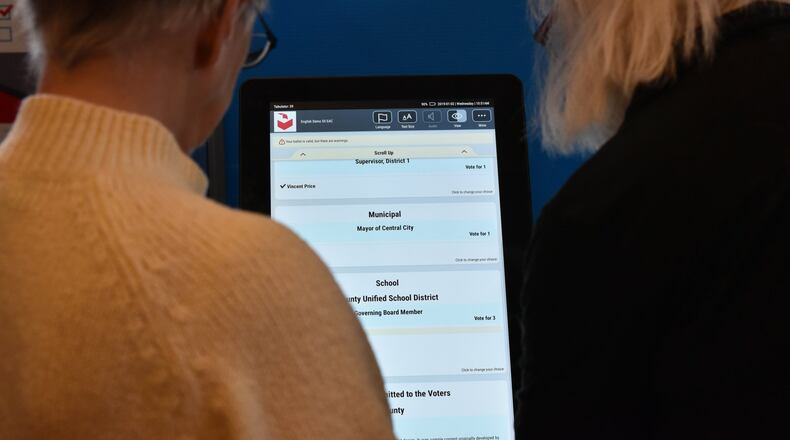At least four election companies submitted confidential bids before Tuesday’s deadline to sell voting machines to Georgia, which plans to become the first state to roll out touchscreen-and-printer voting technology for every voter starting next year.
The competition for the state’s $150 million contract will now be evaluated by government officials, and a decision on the state’s next election company is scheduled for mid-July.
The selection process will fuel debates over election integrity and ongoing lawsuits following a contentious decision by the Georgia General Assembly to switch from electronic voting machines to a similar system that adds printed-out paper ballots. Critics say both systems are inherently insecure, and they want Georgia to use paper ballots filled out by hand.
The Secretary of State’s Office wouldn’t release any information about the companies bidding on the contract, citing a state law that exempts proposals and cost estimates from public disclosure until the government gives notice of intent to award a contract to the successful bidder. The law says disclosure would undermine the goal of obtaining the best value during negotiations.
But four large election companies confirmed to The Atlanta Journal-Constitution that they submitted bids before Tuesday’s deadline.
Though details of bids remained secret, each company must comply with a new state law that calls for the state to use a voting system called ballot-marking devices. Voters will make their choices on a touchscreen, which will then print out a paper ballot. A voter will be able to review his or her paper ballot for accuracy before inserting it into a tabulation machine.
No matter what company is chosen, its voting system will be contested in federal court as part of an ongoing lawsuit that alleges these kinds of electronic voting systems are vulnerable to hacking and tampering.
"None of them is constitutional. They share the same security flaws as the state's current system," said Bruce Brown, an attorney for the Coalition for Good Governance, a nonprofit organization focused on election security. "Any system that puts a computer device between the voter and the permanent record of their vote cannot be audited."
Voting machine companies disagreed, saying their election systems would be secure and accurate, with electronic results that can be checked against paper ballots.
Dominion Voting, Election Systems & Software, Hart InterCivic and Smartmatic are bidding for the contract. A fifth potential company, Clear Ballot, didn't respond to an email.
Government accountability advocates and Democrats have targeted ES&S, the state's current election company, because they said state officials appear to be tilted in its favor. Republican Gov. Brian Kemp hired an ES&S lobbyist as his deputy chief of staff in January, and he has supported the kind of ballot-marking technology pushed by ES&S.
ES&S, based in Nebraska, proposed that the state use its ExpressVote touchscreen and separate DS200 ballot scanner.
“It is user-friendly for both poll workers and voters,” ES&S spokeswoman Katina Granger said. “ES&S equipment is also fully auditable, providing proof of accuracy and reliability in Georgia elections.”
Hart InterCivic, based in Texas, pitched its ballot-marking device called Verity Duo, saying it would guarantee accuracy by scanning printed votes rather than tabulating votes encoded in bar codes the way other companies do.
“Verity Duo clearly expresses the voter’s selection in plain text that is then verified for accuracy by the voter before casting the ballot,” said Graham Thompson, a lobbyist for Hart InterCivic. “Words matter, and we read the words on the ballot to create the cast vote record — not a bar code that is not human-verifiable.”
Smartmatic, based in London, said its experience as a worldwide elections technology company will give voters confidence in the reliability and security of its voting system. The company didn’t provide information about the technology it is proposing to Georgia.
Dominion Voting, based in Denver, confirmed it was bidding for Gerogia’s contract but declined to share details.
The selection process for Georgia’s voting system will be handled the same way as other competitive bids, according to the Georgia Department of Administrative Services.
Bids will be scored based on cost as well as an evaluation committee’s appraisal of how well voting systems meet the state’s specifications. The voting system with the highest overall score will win the contract.
About the Author
Keep Reading
The Latest
Featured




